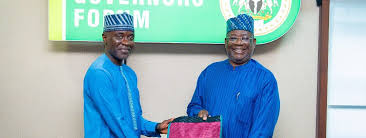News Investigators/ The Nigerian Communications Commission (NCC) and the Nigerian Governors’ Forum (NGF) have pledged their commitment to enhancing broadband connectivity and safeguarding critical national information infrastructure (CNII) across states.
The two institutions made the pledge when the NCC Executive Vice Chairman, Aminu Maida, paid a courtesy visit to NGF Director-General, Abdulateef Shittu at the forum secretariat in Abuja on Thursday.
NGF Director, Media and Strategic Communications, Yunusa Abdullahi in a statement quoted Maida pledging the NCC’s technical leadership and regulatory clarity to ensure rapid and secure broadband expansion.
Mr Maida, however, emphasised the need for alignment between national and subnational digital infrastructure, describing it as a “game changer” for Nigeria’s digital economy.
Commending the NGF willingness to partner NCC, Maida said that the openness of the NGF to engage with the commission reflected a shared belief in the impact digital solutions can have on subnational development.
Also noting the Right of Way (RoW) fees, currently set at N145 per linear meter, Maida described it as a significant burden on telecom companies.
He, however, urged states to waive or reduce those fees to facilitate fibre optic deployment, stating, “the Right of Way is a critical element in opening up the digital economy, and this lies within the purview of the states.”
He said that easing RoW barriers would enable telecom companies to create more value chains, benefiting citizens and increasing tax revenues for states.
In his remarks, Shittu highlighted the centrality of broadband and secure infrastructure to state development.
He said, “broadband and secure information infrastructure are no longer optional inputs to development. They are foundational public goods.”
Mr Shittu noted that while Nigeria had seen rapid growth in connectivity, national broadband penetration remains below the level needed for inclusive digital transformation.
To address challenge, the NGF director-general proposed four pragmatic areas for deepened partnership including institutional alignment through State Broadband Coordinating Councils.
He also proposed policy harmonization to standardize RoW rules, CNII resilience through state-level protection plans, and information sharing to enhance capacity building.
The DG referenced the World Bank’s SABER initiative as a successful model, noting that states that have harmonized RoW fees, and adopted coordinated trenching practices have seen a rapid increase in fibre deployment.
“These policy choices have produced rapid increases in fibre kilometres and improved access to high-capacity networks,” he said.
He also highlighted the socio-economic benefits of expanded fibre coverage to include improved productivity, job creation, and expanded access to education and health services.
The NGF proposed leveraging the upcoming NCC business roundtable to convert commitments into concrete state-level pledges.
Mr Shittu further proposed that “the NGF and the NCC jointly convene a series of follow-up workshops to translate best practices from leading states into implementable toolkits for lagging ones,” while advocating for measurable targets and clear timelines.
As Nigeria strives for universal, affordable, and resilient connectivity, the NCC-NGF partnership signals a collaborative path forward.
With states controlling critical administrative processes like land use and security, Shittu affirmed the NGF’s commitment to bring political will, coordination capacity, and the convening power of the governors to bear on the agenda.
Mr Abdullahi noted that while Mr Maida pledged the NCC’s technical leadership and regulatory clarity, Mr Shittu affirmed the NGF’s commitment to bringing “political will, coordination capacity, and the convening power of the governors to bear on this agenda.”
Mr Abdullahi also stated that the landmark engagement sets the stage for a transformative push to bridge Nigeria’s digital divide, with both the NCC and NGF poised to drive measurable progress in the nation’s digital economy.
NAN
